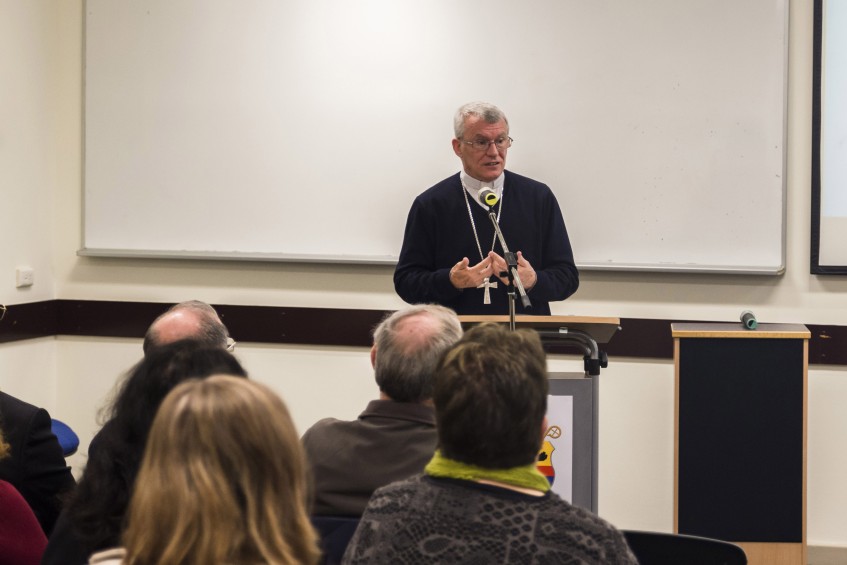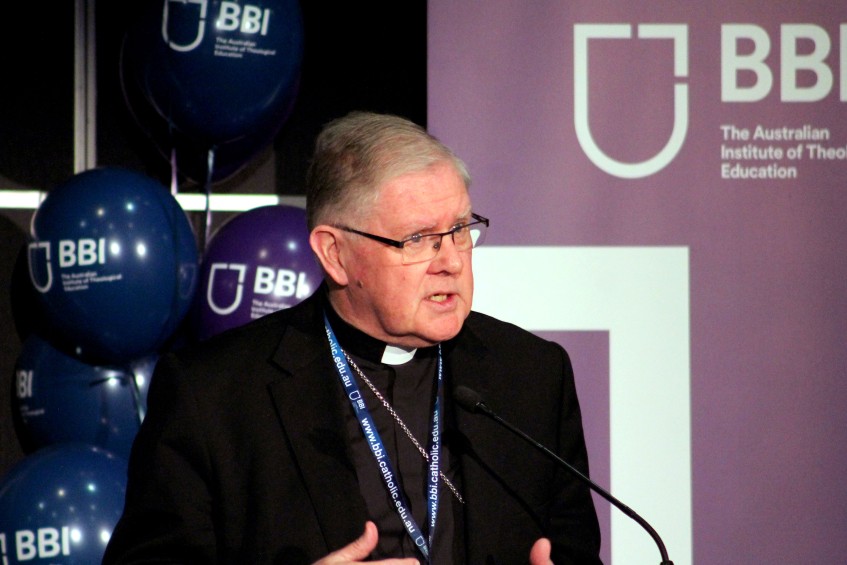Gearing up for the historic 2020 Plenary Council

Archbishop Timothy Costelloe addressing agency directors and leaders earlier in the year at a presentation on the upcoming 2020 Plenary Council. Photo: Jamie O’Brien.
By Josh Low
Perth Archbishop Timothy Costelloe SDB has met with directors and leaders of the various Catholic Church agencies in Perth to discuss the historic proposed 2020 Plenary Council.
The Archbishop’s presentation on the plenary council came in the lead up to the first of a series of consultation seminars held last month in North Sydney that saw some 150 participants.
With the last plenary council in Australia occurring 80 years ago in 1937, the consultation seminars preparing for the 2020 Plenary Council are being led by the Chair of the Bishops Commission for the Plenary Council, Archbishop of Brisbane, Mark Coleridge.
In his presentation to agency directors of the Archdiocese of Perth, Archbishop Costelloe outlined the history and functions of a plenary council, as per canon law.
He explained that a plenary council is ‘to be celebrated whenever it seems necessary or useful to the conference of bishops, with the approval of the Apostolic See.’
The Archbishop said the aim of the council is to make provision for the pastoral needs of the People of God and without prejudice to the universal law of the Church, ‘decide what seems opportune for the increase of the faith, the organisation of common pastoral action, and the regulation of morals and of the common ecclesiastical discipline which is to be observed, promoted, and protected.’
“Because the Plenary Council has legislative and governance power, final decisions are reserved to those who hold the power of governance in the Church by nature of their Episcopal Ordination - the successors of the Apostles,” Archbishop Costelloe said.
“Their decisions are subject to confirmation by the Pope, the successor of Saint Peter as the head of the Apostolic College.
“The bishops are obliged to make decisions on the basis of their careful discernment of the work of the Holy Spirit in the minds and hearts of all the People of God.

Chair of the Bishops Commission for the Plenary Council, Archbishop Mark Coleridge delivering the keynote address at a specially convened seminar The Journey to 2020: Opening the Conversation to the Plenary Council in Sydney last month. Photo: Supplied.
“This process of discernment, which requires careful and extensive consultation with the faithful, is as important as the final process of decision-making,” he said.
Archbishop Costelloe said all the baptised together have received the common vocation to ‘be this sacramental sign in the world, as a chosen people, a royal priesthood, a holy nation and a people set apart,’ sharing in the responsibility for ensuring that the Church remains faithful to the mission given by God.
He added that within this sacramental people are the priests and bishops; a sacramental sign of the presence of the Lord in and to his Church as its servant leader and Good Shepherd.
“Because of the role of governance they have as sacramental signs of the presence of Christ as head of His Church, the bishops have the responsibility of discerning from the various voices within the Church what is in harmony with the authentic teaching, tradition and fundamental beliefs of the Church,” he said.
“The circumstances of the Church in our time have prompted the Church to review, analyse, and discern the signs of the times, to listen anew to the Spirit and to chart its course into the future.
“These include the patterns of change that are evident within the community of the Church, the issues confronting the Church in modern multicultural and secular Australia, the increase in entrusting responsibility for and leadership of the Church's mission to laity, and even the changing face of the episcopate,” he concluded.
